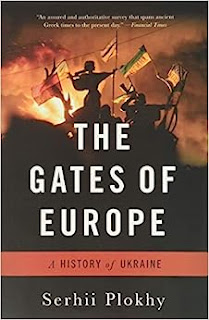from The Gates of Europe: A History of Ukraine by Serhii Plokhy:
The Ukrainian Cossacks, who had begun their international career in the 1550s by serving the tsar of Muscovy, Ivan the Terrible, paid an unsolicited visit to Moscow during the first decade of the seventeenth century. Muscovy was then in turmoil because of an economic, dynastic, and political crisis known as the Time of Troubles. It began at the turn of the seventeenth century with a number of devastating famines caused in part by what we today call the Little Ice Age—a period of low temperatures that lasted half a millennium, from about 1350 to 1850, peaking around the beginning of the seventeenth century. The crisis afflicted Muscovy at a most inopportune time, when its Rurikid dynasty had died out and a number of artistocratic clans contested the legitimacy of the new rulers. The dynastic crisis came to an end in 1613 with the election to the Muscovite throne of the first Romanov tsar. But before the crisis was resolved, a number of candidates for the throne, some of them “pretenders” claiming to be surviving relatives of Ivan the Terrible, tried their political luck, opening the door to foreign intervention.
During the lengthy interregnum, the Cossacks supported the two pretenders seeking the Muscovite throne, False Dimitrii I and False Dimitrii II. Up to 10,000 Cossacks joined the army of Field Crown Herman Stanislaw Zólkiewski of Poland when he marched on Moscow in 1610. The election to the Muscovite throne three years later of Tsar Mikhail Romanov, found of the dynasty that lasted until the Revolution of 1917, did not end Cossack involvement in Muscovite affairs. In 1618, a Ukrainian Cossack army of 20,000 joined Polish troops in their march on Moscow and took part in the siege of the capital. The Cossacks helped end the war on conditions favorable to the Kingdom of Poland. One of them was the transfer to Poland of the Chernihiv land, which the Grand Duchy of Lithuania had lost in the early sixteenth century. By the mid-seventeenth century, Chenihiv would become an important part of the Cossack world. As always, however, the Cossacks both helped and hindered the Polish kings in advancing their foreign-policy agenda. In its war with Muscovy, the Polish-Lithuanian Commonwealth never got the support it hoped for from the Ottoman Empire, partly because of continuing Cossack seagoing expeditions and attacks on the Ottoman littoral.

No comments:
Post a Comment